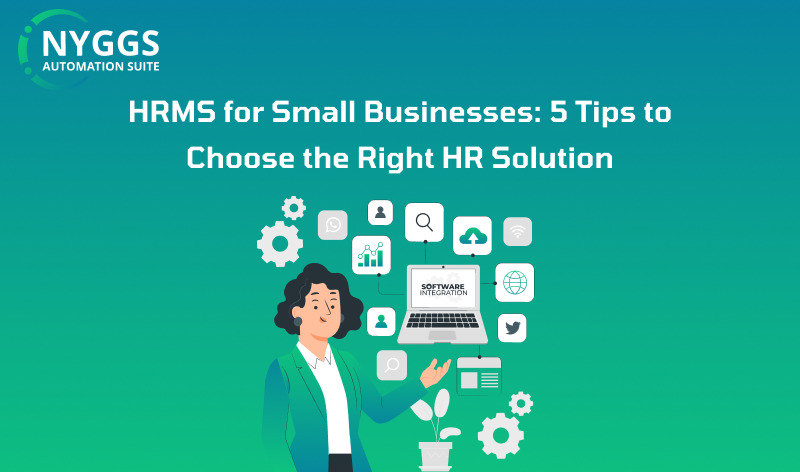As small businesses grow, managing human resources is not an easy task. Tracking employees’ data and processing mass payroll can quickly become overwhelming. Specifically for small businesses with limited resources, these tasks of managing employees bother. This is where HRMS for small businesses comes into play.
Table of Contents
ToggleIn this blog, we’ll discuss what HRMS software is, its features & benefits for small businesses, the costs associated with HR implementation, and how to choose the right HRMS for your business.
By the end of this blog, small business owners and HR professionals can better understand how software can help you and 5 tips on choosing the right one for you. Let’s dive straight into it!
What is HRMS Software?
HRMS stands for Human Resource Management Software. It is a set of tools that can take care of the company’s internal HR operations.
From data management, recruitment, and employee attendance to payroll processing, it can handle many more tasks. It streamlines all your HR workflow to manage the modern workforce. A Human Resource System can be used to produce data on employee behaviours to make informed decisions.
HRMS Software for Small Businesses
HRMS is very important for small businesses because it saves a ton of money by digitalizing several tasks. That is why HRM is intentionally designed to meet their specific needs without breaking the bank. HR has various tools, so the business admins can choose the ones they require, which come in the budget.
Why Do Small Businesses Need HRMS?
When businesses are small, they have limited resources which have to be utilized efficiently. If the resources aren’t invested in the right way, there is more probability of business failure. So, small businesses should have automated systems like this software to drive their businesses ahead in the market.
HRMS for small businesses can help reduce the cost of managing their employees’ data efficiently. This can help them invest those saved resources in more important tasks. It results in boosting their revenue and ultimately leads to business growth.
Features of HRMS Software for Small Businesses
Here we’ll discuss the features of the Human Resource Management System and how they can be beneficial for your Small Business. Let’s have a look.

1. Data Management
HRMS for small businesses provides a full-fledged data management tool focused on efficiently organizing your employee’s data. With organized data, you can view or export any information you need about any particular employee. By recording the data about past promotions and compensations, it’s easy for the admins to make wise decisions during appraisals.
2. Recruitment
Small businesses face recruiting challenges because experienced talents are prevented from working with a start-up company. So, the software provides technical support to recruit manpower for their business. The Applicant Tracking System makes the selection of the right candidate easy.
From posting an opening and filtering the best eligible candidates to making a job offer. You can also maintain joining documents digitally which saves your paper cost. This entire process is done within a few clicks when a lot of applicants apply for the opening.
3. Employee Training
Every employee must have to upgrade their skills to keep up with the evolving technology and processes. The HR for small businesses can help identify this skill gap and guide employee training requirements, as well as monitor significant training costs. Small businesses must have to focus on employee training to grow their business as fast as possible.
4. Payroll Management
The primary function of payroll software is to calculate and pay salaries after holding the taxes and deductions. Small businesses don’t have much time and resources to manage payrolls for every employee. So, the application makes this process easy by implementing its well-defined
formulae to make calculations automatic.
5. Workflow Automation
Small businesses are more focused on growth, but software can handle several time-consuming tasks so that they can concentrate on growing. It is possible to automate recruitment, attendance, payroll, and other HR tasks using the software. The system enables sending automated notifications to all employees to keep them informed about their specific tasks.
What is the Cost of HRMS Software for Small Businesses?
Small businesses have limited budgets. So, making a wise budgetary decision while selecting HR software becomes very important.
Matter-in-fact, the cost of Human resources totally depends upon your requirements and employee strength. As your business grows, then your cost of software increases accordingly.
How to Choose the Best HRMS Software For Small Businesses?
Small businesses need to find the right software that suits their needs. However, there are many HR providers in the market that seem to provide the same services.
Identifying the perfect software provider could be as simple as following these steps.
1. Clarify your HR requirements
The first step in selecting the right HRMS for small businesses is to find your company’s needs which a human resource can fulfill. Be as detailed as possible while making a list of your specific requirements before you begin your search. It allows you to utilize your resources efficiently and avoid wasting money on things you don’t need.
2. Consider your financial constraints
Budget allocation is a significant factor for small businesses because they have limited resources. However, the cost of HR depends on your requirements and the size of the employees. So, you don’t have to spend more on all the HRMS features you are looking for. Consider your HR needs and then allocate finances accordingly for software.
3. Consult with IT & HR professionals
When choosing an HRMS for small businesses, seeking advice from someone in your IT department is necessary. Describe your organization’s HR problems. Your IT specialist knows software trends and can clarify your organization’s software needs and available solutions.
4. Shortlist a few preferred vendors
After you have shortlisted vendors based on your budget and requirements, do detailed research on their products. Try to find a vendor that has a deep understanding of the challenges the HR department faces. Ensure that their products can support integration as well as customization. This is essential for aligning the system with your organizational needs.
5. Ask for conducting a demo
Once you have done the research, now it’s time to ask the vendor for a demo. It helps you better understand how you can implement the system in your business. While testing the software, invite the people who will be using the HR daily. This makes your HR department familiar with the system.
After following these steps, it is easy to make a purchase decision for your software.
Conclusion
In this blog, we’ve covered a detailed guide to HRMS for small businesses. A thorough description of the importance of the app helps you get a better understanding of its benefits. Additionally, this blog contains a roadmap for choosing the right software for your small business.
Now that you have an understanding of how HRMS is significant to small businesses, you’ll have no trouble managing your workforce efficiently.
We want to mention here an affordable but secured HR software provider in India- NYGGS HRMS. This cloud-based HRMS for small businesses provides a free demo of the human resource system for testing.







